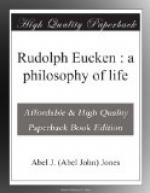The conception of the Trinity is again an attempt to express the union of Divine and human, “the inauguration of the Divine Nature within human life.” The dogma, however, involves ideas of a particular generation, and so threatens to become, and has indeed become, burdensome to a later age which no longer holds these ideas. Further, the doctrine of the Trinity has mixed up a fundamental truth of religion with abstruse philosophical speculations, and this has provided a stumbling-block rather than a help.
At the same time, Eucken lays the greatest stress on the personality of Jesus. He considers the personality of Jesus to be of more importance to Christianity than is the personality of its founder to any other religion. “Such a personality as Jesus is not the mere bearer of doctrines, or of a special frame of mind, but is a convincing fact, and proof of the Divine life, a proof at which new life can be kindled over anew.” And again: “It is from this source that a great yearning has been implanted within the human breast ... a longing for a new life of love and peace, of purity and simplicity. Such a life, with its incomparable nature and its mysterious depths, does not exhaust itself through historical effects, but humanity can from hence ever return afresh to its inmost essence, and can strengthen itself ever anew through the certainty of a new, pure, and spiritual world over against the meaningless aspects of nature and over against the vulgar mechanism of a culture merely human.” But while he would appreciate the depth and richness of the personality of Jesus, he protests against the worship of Jesus as divine, and the making of Him the centre of religion. The greatness of Christ is confined to the realm of humanity, and there is in all men a possibility of attaining similar heights.
Christianity is, in Eucken’s view, much more closely bound up with historical events than any other religion, and it thus suffers more severe treatment at the hands of historical criticism than any other religion. Eucken considers such historical criticism to be of great value. In Christianity as in other religions we find the eternal not in its pure form, but mixed with the temporal and variable, and historical criticism will help in the separation of the temporal from the eternal elements. In so doing it does an immense service, for it frees religion from fixation to one special point of time, and enables us to regard it as ever developing and progressing to greater depths.




